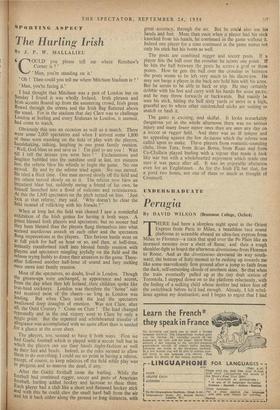SPORTING ASPECT
The Hurling Irish
13) J. P. W. MALLALIEU COULD you please tell me where Renshaw's Corner is 7 ' ' Man, you're standing on it.'
' Oh I Then could you tell me where Mitcham Stadium is ? ' ' Man, you're facing it.'
I had thought that Mitcham was a part of London but on Sunday I found it was wholly Ireland. Irish phrases and Irish accents floated up from the sauntering crowd. Irish green flowed through the streets and the Irish flag fluttered above the stand. For in the stadium that day Clare was to challenge London at hurling and every Irishman in London, it seemed, had come to watch.
Obviously this was an occasion as well as a match. There were some 2,000 spectators and when I arrived some 1,800 of these were standing on the field of play with the players, handshaking, talking, laughing in one great family reunion. ' Well, God bless us and save us ! I'm glad to sec you ! Wait till I tell the missus you were here ! ' Exclamations and laughter bubbled into the sunshine until at last, ten minutes late, the referee blew his whistle to begin the game. No one moved. By and by the referee tried again. No one moved. He tried a third time. One man moved slowly off the field and ten others moved slowly on to it. The referee now blew an impatient blast but, suddenly seeing a friend of his own, he himself launched into a flood of welcome and reminiscence. At this the 1,800 spectators on the pitch turned on him. ! Just look at that referee,' they said. ' Why doesn't he clear the field instead of rollicking with his friends 7 ' When at long last the field was cleared I saw a wonderful exhibition of the Irish genius for having it both ways. A Priest blessed both players and spectators; but no sooner had they been blessed than the players flung themselves into what seemed murderous assault on each other and the spectators flung imprecations at the players. This furious battle went on at full pitch for half an hour or so, and then, at half-time, instantly transformed itself into blessed family reunion with players and spectators mingling joyfully on the field and the referee trying feebly to direct their attention to the game. There- after followed another half-hour of sound and fury melting once more into family reunion.
Most of the spectators, no doubt, lived in London. Though the grown-ups were unchanged, in appearance and accent, from the day when they left Ireland. their children spoke like true-bred cockneys. London was therefore the `home' side and received most of the cheers—so long as London was leading. But when Clare took the lead the spectators swallowed deep draughts of emotion. Was not Clare, after all, the Ould Country ? ' Come on Clare ! The lead changed repeatedly and in the end victory went to Clare by only a single point. But the repeated and wholehearted transfer of allegiance was accomplished with no more effort than is needed for a glance at the score sheet.
The players, too, seemed to have it both ways. First we had Gaelic football which is played with a soccer ball but in which the players can use their hands rugby-fashion as well as their feet and heads. Indeed, as the rules seemed to allow them to do everything, I could see no point in having a referee, except, of course, to keep relatives off the field while play was in progress and to remove the dead, if any.
After the Gaelic football came the hurling. While the football had combined rugger, soccer and parts of American football,. hurling added hockey and lacrosse to these three. Each player had a club like a short and flattened hockey stick and with this he could claw the small hard ball from the air and hit it back either along the ground or long distances, with great accuracy, through the air. But he could also use his hands and feet. More than once when a player had his stick knocked from his hands, he continued in the game without it. Indeed one player for a time continued in the game minus not only his stick but his boots as well.
The posts are combined rugger and soccer posts. If a player hits the ball over the crossbar he scores one point. If he hits the ball between the posts he scores a goal or three points. How he gets the ball over the crossbar or between the posts seems to be left very much to his discretion. Ho may not barge a player in the back nor hold him with his arms. But he seems to be able to hack or trip. He may certainly dribble with his feet and carry with his hands fur some paces; and he may throw forwards or backwards. But mainly ho uses his stick, hitting the ball sixty yards or more in a high. graceful arc to where other outstretched sticks arc waiting to snatch or bash it.
The game is exciting, and skilful. It looks remarkably dangerous yet in the whole afternoon there was no serious injury and many fewer minor ones than are seen any day on a soccer or rugger field. And there was no ill temper and no appealing against the few decisions which the referee was called upon to make. These players from romantic-sounding clubs, from Tara, from Brian Borns, from Ruan and from Cu-Chullain played hurling with a vigour that made it look like war but with a wholehearted enjoyment which made one sure it was peace after all. It was an enjoyable afternoon even for an Englishman. As for the Trish bet that, for a good two hours, not one of them so much as thought of Cromwell.


































 Previous page
Previous page